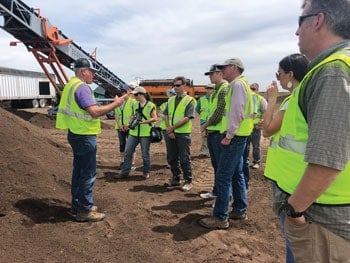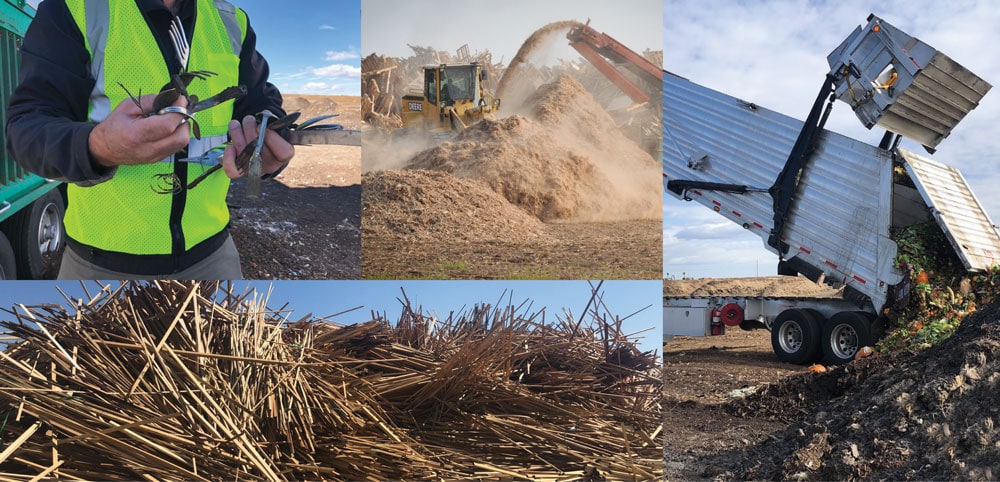In business for more than 45 years, A1 Organics continues to innovate organics recycling processes while taking advantage of increased market opportunities and fully supporting regulatory compliance and the need to ensure public health and safety.

A1 Organics (Eaton, CO) opened in 1974 on land originally homesteaded by the Wilson family in the late 1800’s. A1 currently employs between 45 and 50 employees at four locations in Colorado. A1 Organics consists of two composting facilities and two green waste recycling and retail yards. A1 Organics is a commercial composter with millions invested in processing and handling equipment for recycling organic materials. Their largest processing facility operates on more than 430 acres and has over 220,000 cubic yards of compost in process at any given moment. A1 Organics recycles residential SSO (Source Separated Organics), log, limb, grass, leaves, brewery residuals, water municipalities biosolids, commercial clean lumber, residential yard/food waste, commercial food waste, FOG (fats, oils, greases), and many more types of organics. In the past A1 Organics had a hauling service but chose to focus on what they do best—organics recycling. Now, material is brought to our four recycling facilities for processing from either a commercial hauler, municipality, commercial landscaper, or local residents.
Currently servicing all of Colorado, A1 Organics is nationally known as a leader in the industry and has staff on the Board or Directors of the U.S. Composting Council. A1 Organics partners with many organizations across the country and worldwide, including Harvest Quest, VRM Biologic, Sustainable Enterprises and many more
Closing the Compost Loop
The robust economy has provided additional growth opportunities and increased revenues. “New commercial and residential construction, municipal public works, and Department of Transportation projects requiring compost have increased market opportunities and expanded emphasis on diversion of organic waste from less environmentally friendly disposal options. Market expansion into hemp production has also provided new market opportunities for both product sales and waste diversion,” says Bob Yost, A1 Organics’ Vice President and Chief Technology Officer.

Top middle: Pallet grinding at Eaton, CO facility. Bottom left: Diverted lumber scraps from a local lumber mill.
The regulatory horizon is always changing. New regulations related to organic waste diversion and use of compost in response to climate change initiatives are at the forefront of State and Municipal regulators. Regulations and recommendations surrounding use initiatives of compost are of most importance, for example, permit requirements for soil amending with compost on new commercial/residential building, compost on new irrigation system installs to add increased soil water retention rates, and public use departments adding compost from city diversion initiatives for annual soil maintenance on public parks and lands. Without markets and uses for compost produced from diversion requirements, a circular economy cannot be sustained. “It is becoming increasingly more expensive to meet these requirements. New regulations seem to always involve more robust testing and reporting, and the need for additional equipment and processing; these costs are put on the producers,” says Yost. “This is why ‘Closing of the Compost Loop’ (diverting, recycling, returning) is so important in order to supplement/control the cost of tipping fees with the consumption/sale of finished product back into the generating markets. As more programs go online to divert waste, diverting and recycling are the first step, the second step is responsibility/commitment to using the product generated,” says Kent Pendley, Chief Operations Officer.
A1 Organics fully supports regulatory compliance and the need to ensure public health and safety is paramount in their operations. A1 sources internal and external resources (specialized consultants) to help address changing regulations. There is no doubt that changing regulations put economic and logistical burdens on commercial composting operations.
 Challenges with the Stream
Challenges with the Stream
With A1 Organics recycling more than 425,000 tons of organic waste a year, part of their waste stream is in residential/commercial food waste, which means innovating the process to handle the challenges faced with contamination (plastic, non-compostable packaging and other random items, aka vacuums/tires., etc.) is crucial.. More importantly, A1 Organics actively works with generators (cities, residents, haulers) to remember it is not the composter’s responsibility to remove these items; it starts at the level of the generator. “A1 Organics is committed to educating with onsite tours, digital marketing efforts, and speaking at sustainable/recycling events,” says Clinton Sander, Marketing Manager.
“The world’s eyes are wide open when it comes to preserving our natural resources and restoring our soil quality. As more and more residents, cities, events, and states want to raise their diversion rates from landfills, they need to remember valuable products (compost) are being produced by these efforts. Just like reusing glass to make another bottle, reusing green waste/food waste in the form of compost, puts valuable organic matter and beneficial microorganisms back into our soils,” says Sander.
Efficient Operations
Efficient operations are key to success and growth. Internal operations include production site activities normally focused on materials management that includes waste screening, composting process management, equipment maintenance, and finished product preparation for market. Additional internal needs include administrative, technical, product quality, and marketing components. Operators receive industry certified training that includes health and safety emphasis and training; while administrative and technical staff receive ongoing training related to their specific area of responsibility (health and safety, product technical, and quality evaluation, etc.). Hiring practices use local university contacts, internet-based searches and industry networking. Community involvement is also emphasized. A1 Organics conducts numerous site tours, supports community gardens, provides educational material to schools and community groups, provides and promotes community diversion activities, continues to grow their social media presence, and stays involved in community stake holder discussions. A1 Organics networks with the community through its partnership with the State’s Environmental Leadership Program as well as being a Gold Level Partner.
Innovating Organics Recycling
A1 Organics has been in the business for more than 45 years and continues to innovate the organic recycling processes. Examples include the adoption of new enhanced composting techniques, such as the Modified Static Aerobic Pile (MSAP) method, which combines elements of aerated windrow and aerated static pile technologies. Reducing the amount of windrow turns needed and effectively creating a consistence temperature throughout the pile for the life of the composting process. The use of new liquid management processes, such as the ProBio® process that reduces the requirement for bulking agent by rendering liquids to an adsorbent consistency versus an absorbent structure allows A1 Organics to continue to process the 30,000,000 gallons of liquids received a year.
A1 Organics does not shy away from a challenge. They are the primary composter in Colorado that will take Source Separated Organics. While this stream presents many challenges, we believe it is better to face them than send this natural resource to the landfill. A1 Organics has incurred significant financial burdens but continues to innovate and create amazing STA (Seal of Testing Assurance) certified composts that supply so many environmental benefits. Seal of Testing Assurance Program from the US Composting Council is the only national certification program for commercially manufactured compost. Monthly testing and monitoring of compost quality are performed on both processing facilities by independent third parties, per USCC requirements.
Growing the Industry
The biggest challenges in the industry are source separated organics contamination, field tested compostable products, and continued end market growth. “Contamination (debris management) should not be the responsibility of the commercial composter or the hauler. It falls on the generators and they need to continue to support educational programs to keep the stream clean,” says Sander. A1 Organics partners with the Composter Manufacturer Alliance (CMA), a group who’s purpose is to field test compostable packaging at composting sites across the country. This organization provides product testing and continues to support the manufacturers’ mission to create a quality compostable product.
Yost explains, “All generators need to make a commitment to return this “natural resource” back to the area it came from. The benefits are absolutely incredible, and this choice should be easy. We just need more generators making the choice to bring a percentage or an equivalent amount of compost back that corresponds to the amount of waste diverted.”
A1 Organics will continue to grow and provide the organics recycling outlet that Colorado needs as well as support and partner with Colorado agencies and businesses to make the state the number one diverter in the country while growing the industry. Travis Bahnsen, President, says “We will continue to look at innovation in organics recycling that includes enhanced technology. A1 Organics will stay committed to ‘Closing the Compost Loop’ in Colorado, and making sure this valuable natural resource is being put back into the soil.” | WA
For more information, e-mail [email protected].
